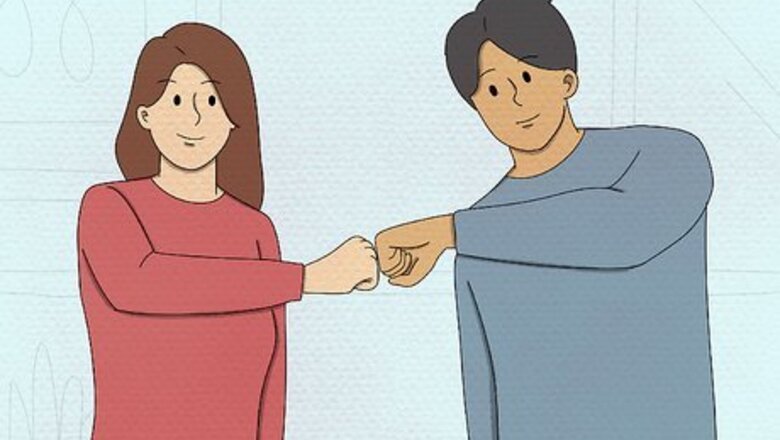
views
- Set boundaries in your friendship, such as avoiding physical affection, flirting, and date-like outings.
- Let your romantic partners (if either of you have them) know about the friendship and be respectful of their feelings and concerns.
- Be honest about any romantic attraction that develops and take a step back from the friendship if needed.
Create clear ground rules.

Boundaries help your relationship grow and prosper. If you're going to be friends, avoid blurring the lines. Straying into romantic or sexual territory can cause a lot of unnecessary tension between you. Talk about this early on and establish some ground rules that will keep you both within the confines of the relationship you want to have. For example, you might agree that you'll never go out on date-like experiences where you might feel more pressure to take things in a different direction. Not being over at each other's homes alone together late at night, or not drinking together, can also keep things from accidentally slipping outside the friend zone.
Avoid flirting to reduce sexual tension.

Keep things strictly friendly so the lines don't get blurred. It's natural for the two of you to be attracted to each other at times. Friendships are based on attraction to some extent just like romantic relationships are. It's completely natural to occasionally get wrapped up in that and feel like you might want to take your friendship in a different direction. Instead, shower them with platonic affection to show that you care for them as a person and a friend but aren't interested in complicating the situation by adding sex or romance to the dynamic. For example, tell your friend how happy you are to hear from them and how much they mean to you. Compliment and praise them for things they do that they're proud of. Try not to flirt with your platonic friend and avoid complimenting them in any way that could be perceived as romantic or sexual.
Give each other plenty of personal space.

Avoid falling into the trap of acting like you're dating. Anything that seems like something a boyfriend or girlfriend would do should be considered out of line. Don't send them "good morning" or "good night" texts or insist on knowing where they are and what they're doing all the time. Have brief conversations, then let them go to do their own thing. Remember that you're not entitled to anything from them, including their time or attention. For example, you don't want to blow up their phone with texts just because you haven't heard from them in a few days. If you really like your friend, it can be difficult to leave them alone—especially as your friendship is just blossoming. But you do want to try to maintain a little distance.
Do things together that build friendship rather than intimacy.

Going out in groups can help strengthen your platonic bond. When the two of you go out and do things alone, it can feel more like a date than two friends going out. Getting a group together makes everything feel more light, platonic, and fun. For example, a picnic at the park sounds romantic when it's just the two of you, but if you invite 4 or 5 other friends it sounds like a friendly get-together. Generally, treat your friend like you would any other friend. Hang out with them the same way you'd hang out with any of your other friends, doing similar activities that you both enjoy.
Avoid talking about sex.

Having sexual conversations will only create tension between you. If you want to keep things as just friends, talking about sex can cause lines to be crossed. When you talk about sex with someone, they're typically imagining having sex with you (whether they want to or not)—and that can cause things to turn in a direction neither of you wants. In general, avoid saying or doing anything that you imagine would make your romantic partner feel uncomfortable or upset if they were there with you.
Celebrate the benefits of a platonic relationship.

The two of you have a lot to gain from a strong friendship. When friends build a relationship based on mutual respect and support, they can really help each other in important ways. And since your friendship doesn't have the potential volatility that a romantic or sexual relationship does, you know that you can be there for each other for the long haul. Here are some other benefits of a platonic relationship: You trust one another and can share experiences on spiritual, intellectual, and emotional levels. You don't have to worry about the doubts, jealousies, and complications that can arise in a romantic relationship. You can fully be yourself and don't feel the need to perform or wear a mask to impress your friend. You gain each other's perspective when dealing with issues that involve other people. You can always count on each other for genuine, fearless, and forthright advice.
Reassure others who might be impacted by your relationship.

Clear the air early to avoid awkward situations later on. Let those close to you know about the nature of your relationship, especially significant others. If there are romantic relationships in the picture, adapt to each partner's boundaries as well so no one feels uncomfortable or gets upset. Avoid prioritizing your friendship over your romantic relationship, even if your friend has been a part of your life for far longer. Your partner's concerns about your relationship can sometimes be the hardest part of trying to maintain a platonic relationship. Assure your partner that you aren't sharing any secrets the two of you have as a couple and that you're not complaining about them to your friend. Don't do anything with your friend that your partner doesn't know about first, and avoid any situations that might look sketchy even if they aren't, such as going over to your friend's house late at night.
Be respectful of each other's romantic partners.

Develop a friendship with your friend's partner as well. Platonic relationships can get tricky when one or both of you becomes attached to a romantic partner. Recognize that it's possible your new romantic partner will be jealous of your platonic friend and might wonder why you aren't sexually or romantically involved. By encouraging everyone to become friends, you can help ease these worries so that your partner feels okay with your platonic friend being in your life. This also means not complaining about your partner to your friend or comparing your friend to your partner. These types of conversations can take you down the wrong path if you're trying to stay platonic. Being respectful of each other's romantic relationships doesn't mean that you can't be there to support your friend when they're going through a difficult time. Just avoid talking trash about your friend's significant other—try to see things from all sides.
Make sure your intentions are pure and true.

Only start a platonic relationship if that's what you want. A lot of people start a platonic relationship because they really want a romantic relationship, but the other person has made it clear that romance is off the table. When you start a friendship because you hope it will develop into something else down the line, you're not being honest and authentic with your friend. That's not to say that you can't become friends with someone who you originally had a romantic interest for. But to do that, you have to be willing and able to let go of your romantic interest completely. If you need to cool your romantic interest, consider taking a week or two off before reconnecting with the person as friends. That'll usually do the trick to help you move on and stop thinking of them that way.
Be honest about your feelings as they develop.

Hiding how you feel about your friend can only make the situation worse. Openness and honesty are really important in platonic relationships. Being able to talk about your feelings with each other is part of what makes you such close friends—and this includes times when your feelings about them might change. In some cases, if you feel like you're developing unwelcome romantic or sexual feelings for them, you might need to take a break from each other to give those feelings a chance to subside. For example, you might say, "I've been feeling very attracted to you lately and I know that's not really part of our dynamic. Let's take a break for a week so I can get a handle on these feelings and then we'll see where we stand." These conversations can be difficult to have, but they're important if you want to remain honest and above board with your friend and maintain a strictly platonic relationship.




















Comments
0 comment